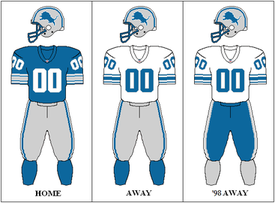1997 Detroit Lions season
| 1997 Detroit Lions season | |
|---|---|
| Head coach | Bobby Ross |
| General manager | Chuck Schmidt |
| Owner | William Clay Ford, Sr. |
| Home field | Pontiac Silverdome |
| Results | |
| Record | 9–7 |
| Division place | 3rd NFC Central |
| Playoff finish | Lost Wild Card Playoffs (Buccaneers) 10–20 |
| Uniform | |
 |
|
|
|||||||||||||||||||||||||||||||||||||||||||||||||||||||
|
|||||||||||||||||||||||||||||||||||||||||||||||||||||||
| Scoring summary | ||||
|---|---|---|---|---|
| 1 | NYJ | John Hall 32-yard field goal | Jets 3–0 | |
| 1 | NYJ | Adrian Murrell 14-yard run (John Hall kick) | Jets 10–0 | |
| 2 | DET | Jason Hanson 44-yard field goal | Jets 10–3 | |
| 3 | DET | Jason Hanson 25-yard field goal | Jets 10–6 | |
| 4 | DET | Barry Sanders 15-yard run (Jason Hanson kick) | Lions 13–10 | |
The 1997 Detroit Lions season was their 68th in the National Football League (NFL).
This season marked the Lions qualifying for the playoffs. Bobby Ross replaced Wayne Fontes as head coach. The highlight of the season was Barry Sanders becoming the third player in NFL history to rush for at least 2,000 yards in a season. Sanders shared the 1997 Associated Press MVP Award with Packers quarterback Brett Favre.
As a team, the Lions set an NFL rushing record, gaining 5.51 yards per rushing attempt. The Lions scored 379 points in 1997, the fourth-most of any team in the league.
The final game of the regular season, on December 21, was marked by emotional highs and lows. Entering the game at 8–7 and needing a win to secure a playoff berth, the Lions played host to the 9–6 New York Jets, who like the Lions would be eliminated from the playoffs with a loss (although the Jets still had a chance to win the AFC East and get a home playoff game). In addition, Barry Sanders entered the game with a chance to potentially break the NFL's single season rushing record— Sanders entered the game with 1,869 rushing yards, leaving him 131 from 2,000 and 237 away from what would have been a record setting 2,106 yards, topping Eric Dickerson's 2,105 set in 1984. The Lions won the game 13–10, clinching the playoff spot and eliminating the Jets from the playoffs. A fourth-quarter touchdown run by Sanders proved decisive, and he finished with 184 yards to top out at 2,053 for the year. At the time, Sanders became only the third man to rush for 2,000 yards in a season behind O. J. Simpson and Dickerson and had rushed for the second most yards in a season (since Sanders, Terrell Davis, Jamal Lewis, Chris Johnson, and Adrian Peterson have accomplished the feat; Sanders' total is now the fourth highest total behind Dickerson's 2105, Peterson's 2096 in 2012, and Lewis' 2066 in 2003).
...
Wikipedia
